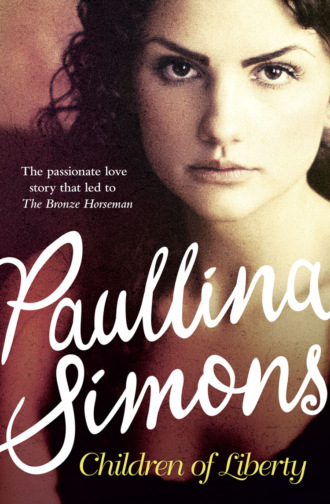
Полная версия
Children of Liberty
“Do you live here in the North End?” Gina asked Harry.
It was Ben who answered. “No, we’re from Barrington. Just a small town in the hills about ten miles northeast of here.” He smiled. “Not too far from the ocean.”
“Ah, Mr. Shaw,” said Harry, turning to his friend, “so now you’re from Barrington?”
Ben punctuated his blink with a swig of wine. “Oh, that’s right. My friend forgot to tell you his full name. Gina, Salvo, he is Harry Barrington.”
Gina and Salvo sat, taking this in.
“Barrington like the town?” Gina said finally.
“Exactly like it. Full relation.”
Gina gaped at Harry, but stopped when she glimpsed from the periphery of her vision Salvo’s sour face. “You have a whole town named after you?”
“Oh, not after him, miss,” Ben said. “After his productive and illustrious family. They built that town, you see. All Harry does is use the town library.”
“That is not true,” Harry said. “I also eat at the restaurants.”
Gina was impressed and slightly surprised. Harry in his dapper suit and fancy hat and slightly indolent air didn’t look to be the kind of young man who worked with his hands. “You’re from a family of builders?” she asked, trying not to sound incredulous.
“My father isn’t there with a hammer and nails, if that’s what you mean,” Harry replied. “He’s a merchant. He makes sure other people do the work.”
Ben laughed. “I can’t wait to hear you tell your father this. That seven generations of Barringtons, who built not only Boston but funded the expansion of the very university you get all your snooty notions from, got their solid reputation from nothing more than making sure other people did the work. I can’t wait.”
Harry waved him off. “Ben, you forgot to tell our new friends who you are.”
“I told them. Ben Shaw.”
“Yes, but who is Ben Shaw?”
“Humble engineering student?”
“Son of Ellen Shaw,” said Harry. “Who just happens to be the youngest sister of Robert Gould Shaw, the man who commanded the only all-black regiment in the Union Army during the Civil War.”
If Gina didn’t know any better, she might have thought they were trying to impress her, or perhaps in a game of one-upmanship emerge victorious in their teasing of each other in front of her. Salvo did know better, and it was certainly what he thought, because all he said by way of comment was a gruff, “Your uncle is black?”
“No, quite white,” said Harry. “And a colonel. He just happened to be the white colonel who took the job no one else wanted, or would take.”
“I keep telling you,” Ben said. “No one’s heard of him.”
“Well, someone must have heard of him, Benjamin,” Harry said pleasantly. “Because an architect named Stanford White spent fourteen years sculpting your uncle’s memorial.” He leaned back with self-satisfaction. “Ben comes from a very illustrious family,” Harry continued. “Aside from his martyred uncle, he is also the nephew of Josephine Shaw Lowell, who is a living legend in New York, advocating for peace, for women’s rights, active in politics, and she happened to co-found an organization with Erving Winslow called the Anti-Imperialist League right here in Boston.”
“In a tiny airless room in a walk-up on Kilby Street,” Ben said. “Not exactly remodeling Harvard Hall.”
Gina had never heard of the people they were talking about. She felt young and stupid. “Anti-Imperialist?” was what she echoed.
“I assume anti-American-imperialist,” said Harry. “Right, Benji?”
“Since my mother will be running it, can there be any other kind?” Ben turned to Gina. “But this has nothing to do with me.”
“What does my grandfather,” Harry interrupted, “or my father for that matter, have to do with me?”
“Oh, come on! It’s a direct relation.” Ben rubbed his hands together.
“And your mother is not?”
“Am I a descendant of Robert Treat Paine?”
Harry groaned.
“Aha!” Ben was triumphant. “Robert Treat Paine was one of Harry’s ancestors on his mother’s side.”
“Who is Robert Treat Paine?” It pained Gina to ask; she feared she should have just known.
Ben smiled benevolently. “He was one of the founding fathers of the United States.”
She knew she shouldn’t have asked.
“He had quite a reputation, didn’t he, Harry?”
“I don’t know what you mean. A reputation as a ladies man? As an intellectual?”
Ben leaned across to Gina. “Robert Treat Paine was known as the man who proposed nothing, but opposed everything proposed by others. He was called the objection maker.”
“How is this relevant?” Harry demanded. “Why would this young lady and her brother care? Look how bored they are.”
Ben laughed.
They continued to talk and joke and drink while Gina faded into the stiff wooden chair, trying to sit like a lady, to keep her elbows off the table, her bare damp arms straight. But her back hurt, her neck hurt, her legs hurt from being up so long—on the boat, on the docks, walking through North End, and now sitting here with these smart men. Salvo was smoking, trying to stay vigilant and awake. Mimoo was soundly sleeping. Salvo needn’t have worried. Gina policed herself. With a slight tremor she realized how infantile she was to think even for a moment that she could hold a conversation with actual men. That’s how she knew she was infantile. Because she thought she could. To think that a curl of her brown hair or a sway of her long girlish skirt, or the sheen of her tanned Sicilian soft skin could make up for the fact that when she opened her mouth she was nothing more than a contadina from the rural outskirts of a Sicilian town, where they milked the cows and took the olives off the trees in season. They fished all summer and hoped the volcano wouldn’t erupt, again. Oh, the fallacy of herself!
Reluctantly she withdrew from the conversation, hoping they would interpret her intimidation as exhaustion. One side of her hair bun had come loose and was dangling a long wavy strand down the side of her neck. Her brother kicked her chair. She ignored him. He kicked the chair again, harder. She looked over at him. What, she mouthed with irritation. He gestured to her hair with his eyes.
You want me to tie up my hair, she rhetorically mutely asked him. Fine, here you go. Raising her hands to her head, she pulled out all the pins and laid them on the table, in front of her plate. Her hair was now out of the bun and fell down her back and over her shoulders, chocolate, wavy, ungainly. Completely ignoring what she knew with delight was her brother’s appalled expression, she lifted her hands to her head and section by section proceeded to pin the hair back in a high chignon. The three men watched her; no one moved; only her bare arms moved.
Salvo croaked, “It’s getting late …”
Harry and Ben ignored him.
“What does your friend Angela do in Lawrence?” Ben asked, gaping at Gina in the near dark from across the table as the candlelight flickered out.
She wouldn’t allow herself a glimpse at Harry. “She works in a textile factory.”
“Is that where you want to work?” Ben smiled. “On the looms?”
“No,” she replied. “Too hot on the looms. I want to work in the mending room. It’s more refined.”
“No,” Salvo cut in. “Gina and I are going to open our own business like true Americans.”
“Salvo, be quiet,” Gina snapped. “Who has money to open their own business? We don’t have money to pay these kind gentlemen for staying here. We have to find work first, save a little money. Then maybe we can boast about what we plan to do.”
“That is what I’m going to do, sister. No use arguing me out of it.”
Harry and Ben appraised the sister and brother.
“A business is a good idea,” Ben said.
Harry said nothing.
Sticking his fingers in Harry’s ribs, Ben tried to explain his friend’s silence. “My friend is conflicted about business.”
“Not at all,” said Harry. “I know exactly how I feel about it.”
“Yes—conflicted.” Ben chuckled. “Harry is burdened by his father’s expectations. Now some might argue it’s better to have a father, even a demanding one, but Harry disagrees.”
“It’s better to have a father,” Gina said quietly, “even a demanding one.”
“Oh, I agree with you, Gina,” said Ben. “But Harry struggles every day against unfulfillable projections, while I run scattershot from hobby to hobby, having no burdens placed on me whatsoever.”
“Except by your radical mother,” said Harry.
“Where is your father?” Gina asked Ben.
“I don’t know. I’ve never met him.”
Gina pondered that—not to know your father. It was inconceivable. In Sicily, every child knew who his father was.
“I, on the other hand,” said Harry, “have met my father, but I know him even less than Ben knows his.”
Gina wasn’t sure how to respond. “Doesn’t your mother want you to become someone, Ben?”
“I don’t know,” Ben said. “She doesn’t say to me, son, you must follow in my footsteps.”
“Yes, she does,” said Harry. “And my father doesn’t say this either. He says, whatever you do is fine with me. Which is even worse. Aside from being wholly untrue.”
Gina really pondered that one. “That’s worse?” she said at last. Was it the language barrier that made comprehension of this insurmountable? What were they actually saying?
“Yes, it’s worse,” Harry said. “Because action on my part is implied and required. Do what you like, he says, but do something.”
“Ah.” There was a significant pause—it was late at night, after a long day. “But you do want to do something, don’t you?”
“I’m not sure.” Harry half-smiled at her. “What if I don’t?”
“Harry is joking,” Ben said.
“A man has to do something,” said Gina.
“What about a woman?” Harry’s fog-colored eyes twinkled a little.
“A woman’s role is clear. She must keep house, raise children.”
“What if she wants to work?”
“She is working.”
“Work outside the home.”
“In Italy, there is no such thing,” Gina said. “If she sells fruit at the market or sews for other people or cleans big homes, she must do it between hours. First her own house, her own children. Then everything else.”
Ben gazed at her in appreciation.
Pensively Gina stared at Harry. “Are you an only child?”
“I am an only son,” he replied, not looking directly at her. “I have a sister.”
Ben made a dismissive sound. “Esther is invisible to your father.”
“Just to my father?”
“What?” When Harry didn’t elaborate, Ben shrugged with a dismissive chuckle. “It’s like royalty at Harry’s house. Only the male offspring can inherit the throne.”
They were joking! Except that really was how it was. Gina’s father was an anomaly among Sicilian men. He adored his sons, but believed his only daughter too could become anything. Gina wanted to tell these two boys about her remarkable father, but decided not to. She was losing the power to make sense in her new alien language. Silently she thanked her father for being a relentless taskmaster, for teaching her English for so many years even when she had seen no sense in it.
“Our father believed,” she said cautiously, unsure of her English words, “that those who lived without expectations were not blessed but cursed.” She looked across the table. “Right, Salvo?”
“I know nothing,” Salvo said in Italian, “except that it’s late and I’m tired.”
“Your father wasn’t the only one who believed this,” said Harry, in reply to Gina, not Salvo. “My father, too. And Alexander Pope.”
“Who?”
“The poet.”
“No, Harry,” said Ben. “Pope thought a life lived without expectations was the ninth beatitude. Blessed are they who expect nothing, was what Pope wrote.”
“You completely misunderstand Pope,” Harry said, yanking up Ben by the arm, and glancing around for his jacket and hat. “As if you have any idea what a beatitude even is.”
“As if you do.”
“At least I’m not quoting him incorrectly! We must go.”
“Actually you did quote him incorrectly,” said Ben, as they bade their goodbyes to a battle-fatigued Gina.
“I didn’t quote him,” Harry said. “I was merely being polite in a conversation with our new friends. Goodnight. We will see you tomorrow. Please give our regards to your mother.”
“Pope ended it with ‘for they shall never be disappointed.’”
“Let’s go!”
They tipped their hats before they put them on and bowed politely.
Gina could see Salvo would have loved to have refused their help, but he didn’t know where the train station was and couldn’t get the three trunks downstairs without them. To pay her back he stood between her and the young men so they couldn’t take her hand, couldn’t treat her like a lady when they wished her goodnight.
After Ben and Harry left, Gina and Salvo retreated to separate windows from which they both looked longingly at the sea beyond, but for different reasons: Salvo because he yearned to be back home; Gina because she wanted never to leave the big city. She hoped Lawrence would turn out to be a little bit like a big city, only smaller. But no matter what it turned out like, it wouldn’t have Ben and Harry in it.
“A fine pair they are,” Salvo said to her at last.
“Aren’t they just,” echoed Gina. Especially the sand-haired, laconic one.
He sighed with exasperated disdain. “Sometimes,” he said, “I think you forget what Papa said to you.”
She bristled. “I don’t forget anything.”
“Then why do you act like you do?”
Gina turned away. She didn’t want to hear it. Leaving the room where her brother was making her defensive, Gina went into the room where Mimoo was snoring and sat in a wooden chair by the open window. She still heard horses clomping outside, a distant bell of a trolley car, noises from sailors, laughter, a city alive, pulsing and thumping into the night. Never forget where you came from, Gina Attaviano, Alessandro said to her before he died. Then it will always be easy.
I think it will be easy, Papa, she whispered, gulping the night air. In thrall to the new city, the old life for Gina had vanished with the tide.
Конец ознакомительного фрагмента.
Текст предоставлен ООО «ЛитРес».
Прочитайте эту книгу целиком, купив полную легальную версию на ЛитРес.
Безопасно оплатить книгу можно банковской картой Visa, MasterCard, Maestro, со счета мобильного телефона, с платежного терминала, в салоне МТС или Связной, через PayPal, WebMoney, Яндекс.Деньги, QIWI Кошелек, бонусными картами или другим удобным Вам способом.










